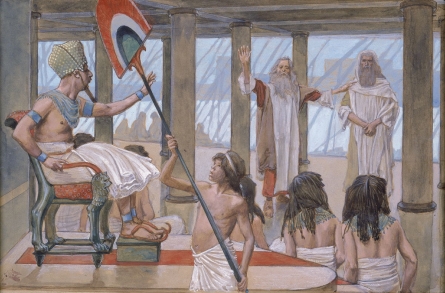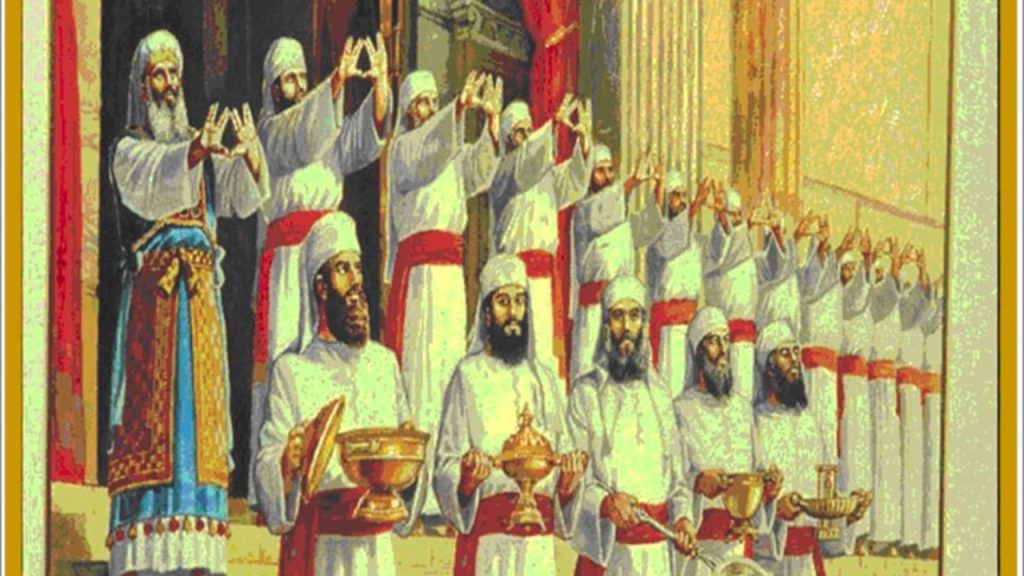These are the names
The book of Shemot / Exodus “Departure from Egypt”, tells the story of the children of Israel enslaved in Egypt and their miraculous redemption through the hand of Mosheh, the story of the giving of the Torah at Mount Sinai, the construction of the golden calf and the construction of the Tabernacle. The Jews will spend the next four parshot (Shemot, Va’era, Bo and Beshalach) in the land of Egypt until finally they leave and start their journey through the desert.

Parashat Shemot
Parashat Shemot (“names”) is both the title for the second book from the scroll of the Torah, Exodus, and the title of the first Torah portion. The parashah tells of the Israelites’ multiply in Egypt, Threatened by their growing numbers, Pharaoh enslaves them and orders the Hebrew midwives, Shifrah and Puah, to kill all male babies at birth. When they do not comply, he commands his people to cast the Hebrew babies into the Nile. The hiding and rescuing of the infant Mosheh, Mosheh in Midian, the calling of Mosheh (The burning bush), circumcision of his son Gershom, meeting the elders, and Mosheh standing before Pharaoh, asking him “Let my people Go!

G-d’s children
The first time the Jewish people are referred to as “G‑d’s children” is in the Torah portion of Shemot , where the verse states: “Israel is My son, My firstborn.” The term “firstborn,” as Rashi explains, denotes maturity. How come The children of Israel ended up being slaves? Has Hashem forgotten about them, and His promises to them? He did remember His promises to Avraham, Yitzchak and Ya’akov, and he brings a Redeemer to their children’s children, for the sake of His name, with love.

Mosheh’ life
A child is born to Yocheved, the daughter of Levi, and her husband, Amram, and placed in a basket on the river, while the baby’s sister, Miriam, stands watch from afar. Pharaoh’s daughter discovers the boy, raises him as her son, and names him Mosheh. As a young man, Mosheh leaves the palace and discovers the hardship of the Hebrews. He sees an Egyptian beating a Hebrew, and kills the Egyptian. The next day he sees two Jews fighting; when he rebuke them, they reveal the fact that he killed an Egyptian the previous day, and Mosheh is forced to flee to Midian. There he rescues Yitro’s seven daughters, marries Tzipporah, and becomes a shepherd.

Mosheh Rabbeinu
According to the biblical narrative, Mosheh lived 120 years, he left Egypt when he was 40 years old, lived in Midian as a shepherd for 40 years and was 80 when he confronted Pharaoh, followed by his wilderness wanderings in the desert for 40 additional years. It means Mosheh lived in the desert for 80 years total!
May you live until 120
We don’t really think about it, but on every birthday we give a common Jewish birthday wish , in reference to Mosheh, “Ad meah v’esrim”, meaning, “May you live until 120.” In Parashat Vayelech, (“and he went”), the 52nd portion out of 54 annual portions, which records the events of Mosheh’ last day of earthly life. “I am one hundred and twenty years old today,” he says to the people, “and I can no longer go forth and come in.” He transfers the leadership to Yehoshua, and based on Devarim Rabba 9:9, he writes 13 Torah scrolls, giving one to each tribe and one to the Levites for safekeeping in the Ark of the Covenant. It is the last portion read before Rosh Hashanah, Mosheh, the greatest prophet of all time, who was born and passed away on the same date the 7th of Adar dies at the age of 120.
Hineni
Mosheh was shepherding the sheep of Yitro, his father-in-law, he guided them into the wilderness, and he arrived at the mountain of G-d toward Horeb. An angel of G-d appeared to him in a blaze of fire from amidst the bush, and he saw that the bush was burning, and the bush was not consumed. Mosheh said, “why is the bush not being burned?” (Exodus 3:1-3). G-d called out “Mosheh, Mosheh,” to which Mosheh replied “Hineni” “Here I am.”
Mosheh calling
Mosheh shows a few of his human flaws and weaknesses throughout his life. He makes mistakes and gets angry, he is humble, shy and having a speech problem. Hashem instructed him to lead the Jewish people and to speak to Pharaoh, ordering him to allow the Jews to leave Egypt for a few days so that they could bring sacrifices to the ‘Hebrew’ G-d. Mosheh refused in total humility, saying that he doesn’t have the capability of leading the Jews and also it wouldn’t be right for him to lead while his older brother would have to follow on in a lower position (Berachot 7). Giving honor to his older brother, Aharon, is viewed as important in Judaism.
The Burning Bush
Rabbi Shnuer Zalman of Lyadi said, that everything in the world, especially the most lowly of worldly objects is infused with the divine. There is a Midrash that asks the question why did Hashem choose the burning of a simple bush to appear to Mosheh? a simple bush in the middle of the desert, even one on fire, is not that unique of a sight, and might be over looked by many. Mosheh had the unique ability to pay attention to each moment and to each individual, a quality which made him the right person to lead the Jewish people.
Mosheh and Aharon

Mosheh did finally accept the position of leader of the Jewish people, and become the greatest leader of all time, proving that anyone is capable of anything if they set their eyes on it. Moshes’ brother, Aharon, is appointed to serve as his spokesman and is happy for Mosheh. Being happy for others is a crucial trait in Judaism and one should avoid being jealous at any costs of other people’s success. In Egypt, Mosheh and Aharon assemble the elders of Israel to tell them that the time of their redemption has come. The people believe; but Pharaoh refuses to let them go, and even intensifies the suffering of Israel. Mosheh returns to Hashem to protest: “Why have You done evil to this people?” Hashem promises that the redemption is close at hand. The end of that story is the beginning of the Jewish nation.
G-d is in the details
“Our spiritual journeys can often be frustrating, and we may be waiting around for that moment of inspiration or enlightenment that always seems just beyond our reach. While we all thankfully have moments of greatness in our lives, those moments of “fire”, our prayers, our work, our relationships, sometimes just seem to be moving all too slowing towards their fulfillment. This can be frustrating, yet like all those who walked past the burning bush, it is all too easy just to move on past the simple holiness that is right in front of us. The essence of Jewish “spirituality” is that we must pay attention to the blessing of the simple moments, and we must keep the greater vision of our lives in front of us. We must channel this focus to move beyond ourselves, to care for our community and the world. It all begins when we simply turn aside and pay attention.”- Rabbi Boris Dolin
Why “Names”?
Shemot starts by counting each of the names of the descendants of Israel that went to Egypt. Our Sages ask, why does our parashah count them, if they were already counted in the previous parashot? Why do they need to be counted again? Why this parashah has such an apparently irrelevant title, “Names” which seems to not adequately represent the story of the Exodus. Our names are deeply connected to our essence and have a big influence in who we are and what we do. Our names are not just ID tags. They define us and mark us forever.
The importance of a Hebrew name
Traditionally, the name of a Jewish baby boy is given at the time of the bris, the circumcision, after the procedure is completed and blessings are given to the baby and his parents. This is the time when the Neshamah, the G-dly soul, enters into the baby and a name is intrinsically connected to the soul.
After 210 years of exile in Egypt, slavery, and torture, the Hebrews kept their Jewish names and did not assimilate. They went down to Egypt with those names and they returned with the same Jewish names.
Based on Isaiah (40:26): “He Who counts the stars, calls them all by name”. The Jews are compared to the stars. When we count something, it is to appreciate its value. As the Hebrews were about to begin and endure the long Exile, they were counted, to ensure they won’t be lost and forgotten. By giving them a name, they become eternal like stars.
Your spiritual energy
The strength that made it possible for the Hebrews to go through the hard Exile without assimilating came from the counting and naming they received. We see from this that a name has a special power. A name is not just a way to identify someone. Your name defines your identity and the way you are in life. According to Kabbalah, the name is the channel in which a person receives his spiritual energy.
The 3 reasons we were redeemed
It’s written that in merit of three things, our ancestors were redeemed from slavery in Egypt: because they kept their Hebrew names, their language, and their traditional clothing.
Choosing a name
Choosing newborn’s name, is about facilitating and giving over to your newborn child the qualities for him to be a good person that will reach personal fulfillment and be able to help others. Similarly, when we name after deceased family members, in addition to honoring our loved ones, it is with the intention that our child will inherit the positive character traits from that person. In the same way that the keeping of Jewish names in Exile was the cause for redemption from Egypt.
Mosheh and The PromisedLand
After assuming the mission to take Israel out of Egypt, Mosheh continued his lifelong struggle. To the very last day of his life, Mosheh pleaded with Hashem to allow him to lead his people into the Holy Land; he braved Hashem’ wrath to eliminate any further galut. The Lubavitcher Rebbe: Hashem said “Enough!” but
Mosheh was not silenced. For Mosheh’ challenge of the divine plan did not end with his passing from physical life. The Zohar tells us that every Jewish soul has at its core a spark of Moshes’ soul. So every Jew who storms the gates of heaven clamoring for redemption continues Mosheh’ struggle against the decree of galut.
May our continued keeping of Jewish names bring the ultimate redemption. Amen and Shavua Tov.
יְבָרֶכְךָ יהוה, וְיִשְׁמְרֶךָ- May the LORD bless you and guard you
יָאֵר יהוה פָּנָיו אֵלֶיךָ, וִיחֻנֶּךָּ -May the LORD make His face shed light upon you and be gracious unto you
יִשָּׂא יהוה פָּנָיו אֵלֶיךָ, וְיָשֵׂם לְךָ שָׁלוֹם- May the LORD lift up His face unto you and give you peace
Check out YedidYah “The Priestly Blessing” Birkat Hakohanim. Music by Rabbi Yakira Yedidia https://youtu.be/YNE11QdEMN0

#####
This blog article was inspired by chabbad.org

